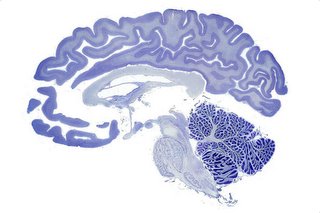Le coeur de la psychologie cognitive: la compositionnalité
The Harvard Review of Philosophy: On this conception, how do you study semantics?
Chomsky: The same way you study phonetics. You look at what's inside: there's something inside the mind, inside the language faculty of the brain. That [faculty] includes entities, we think, like lexical entities that have phonetic properties and semantic properties; there are interesting operations that form internal expressions, symbolic expressions that we compute. And a person uses those to make sounds and to talk about the world. Every aspect of this process can be studied. But it's not going to lead you, as far as I know, to a relation between an internal object and a sound or between an internal object and a mind-independent thing.
HRP: How does this model deal with certain traditionally accepted ideas about language such as compositionality?
Chomsky: Well, actually, this is the source of the traditional notion of compositionality for language. The internal generative processes are the compositionality of language. There was no real theory of compositionality until this kind of thing came along.
HRP: What does the compositionality thesis become?
Chomsky: That internal to the mind-brain, there is a recursive procedure that constructs expressions; certain expressions that are internal are symbolic objects consising of properties. The person uses the properties with the sensory motor system to make noises, and the person uses the properties with various conceptual systems to talk about the world. There's a certain degree of parallelism-in neither case is there any mind-independent entity that is associated with the internal object.
An Interview with Noam Chomsky, Aryeh Weinstein, 4 juin 2002
 Moi
Moi 
 La Patrie
La Patrie  La Santé
La Santé

0 Commentaires, commanditaires:
Publier un commentaire
<< Retour au paillasson